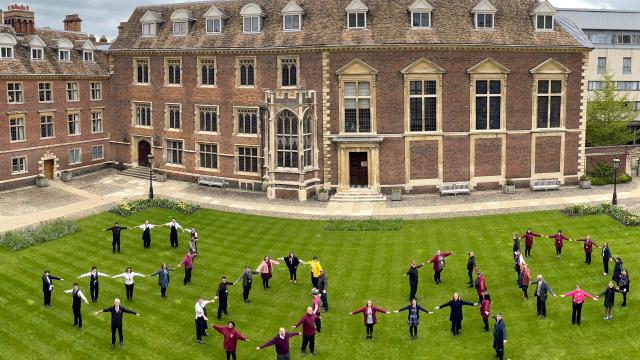
A Fellow of St Catharine's will play a key role in one of four new multi-million-pound centres dedicated to developing improved tests, treatments and potentially cures for thousands of people living with rare medical conditions in the UK. Professor Stefan Marciniak (2011), Director of Studies in Clinical Medicine at St Catharine's, will co-lead the LifeArc Centre for Rare Respiratory Diseases, a UK-wide collaborative centre co-created in partnership with patients and charities.
The four new virtual centres, supported by the charity LifeArc, will focus on areas where there are significant unmet needs. They will tackle barriers that ordinarily prevent new tests and treatments reaching patients with rare diseases and speed up the delivery of treatment trials. The centres will bring together leading scientists and clinical specialists from across the UK for the first time, encouraging new collaborations across different research disciplines and providing improved access to facilities and training.
The LifeArc Translational Centre for Rare Respiratory Diseases is a partnership between universities and NHS Trusts across the UK, co-led by Edinburgh with Nottingham, Dundee, Cambridge, Southampton, University College London and supported by six other centres (Belfast, Cardiff, Leeds, Leicester, Manchester and Royal Brompton). Professor Marciniak will be at the helm of Cambridge's contributions to the new centre.
For the first time ever, it will provide a single ‘go to’ centre that will connect children and adults with rare respiratory disease with clinical experts, researchers, investors and industry leaders across the UK. The £9.4 million centre will also create a UK-wide biobank of patient samples and models of disease that will allow researchers to advance pioneering therapies and engage with industry and regulatory partners to develop innovative human clinical studies.
Professor Marciniak said, “There are many rare lung diseases, and together those affected constitute a larger underserved group of patients. The National Translational Centre for Rare Respiratory Diseases brings together expertise from across the UK to find effective treatments and train the next generation of rare disease researchers.”
Former BBC News journalist and presenter, Philippa Thomas, has the rare incurable lung disease, Lymphangioleiomyomatosis (LAM). Her condition has stabilised but for many people, the disease can be severely life-limiting.
Philippa said, “There is so little research funding for rare respiratory diseases, that getting treatment - let alone an accurate diagnosis - really does feel like a lottery. It is also terrifying being diagnosed with something your GP will never have heard of.”
Globally, there are more than 300 million people living with rare diseases. However, rare disease research can be fragmented. Researchers can lack access to specialist facilities, as well as advice on regulation, trial designs, preclinical regulatory requirements, and translational project management, which are vital in getting new innovations to patients.
Dr Catriona Crombie, Head of Rare Disease at LifeArc, commented:
“We’re extremely proud to be launching four new LifeArc Translational Centres for Rare Diseases. Each centre has been awarded funding because it holds real promise for delivering change for people living with rare diseases. These centres also have the potential to create a blueprint for accelerating improvements across other disease areas, including common diseases.”






